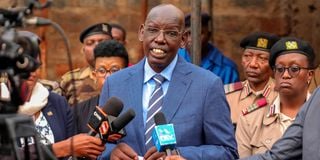Premium
Government admits funding free education a difficult task

Former Basic Education Principal Secretary Belio Kipsang speaks to journalists in Nairobi.
The government has admitted it is struggling to fully fund education programmes, with top officials at the Ministry of Education warning of a looming crisis unless more money is allocated in the Supplementary Budget.
Appearing before the Education Committee of the National Assembly, Basic Education Principal Secretary Belio Kipsang said that the ministry is engaging with the National Treasury over the Sh22 billion budgetary gap that he said is “strategic for proper running of schools”.
However, the chair of the committee, Julius Melly, accused Dr Kipsang of being “bureaucratic” and evading questions over where the money will come from and not giving the public the correct picture.
The increase in enrolment in schools has not been matched with increased funding by the government, leading to the deficit.
“Why don’t you tell the public that you’re committing Sh16,000 [per learner] instead of telling them you’ll give them Sh22,244? Why don’t you have the guts and say it’s Sh16,000? We want an affirmation. You don’t want to give an answer and you don’t want to refuse. You need to come out strongly and say there is money or there’s no money,” said Mr Melly.
The ministry has a budget allocation of Sh22,244 per learner annually for tuition under the Free Day Secondary Education programme. However, this has recently fallen to Sh16,428 due to inadequate funding, leaving schools with huge funding gaps.
“Next year, we project that the enrolment will be 4.2 million learners. If the funding remains as it is, the capitation will reduce to Sh15,476 per learner. We invite the committee and the House to intervene and ensure that learners are funded at the approved rates,” said Education Cabinet Secretary Ezekiel Machogu.
“Over the last five years, the funds provided to the Ministry of Education have fallen short of the approved rate, leading to underfunding of schools. The ministry is compelled to divide the available amount among the learners. This results in capitations that are lower than the approved rate,” Mr Machogu said.
Mr Melly said that school principals are struggling to run schools without adequate funding from the government. Recently, the Kenya Secondary Schools Heads Association presented a proposal to the ministry to raise school fees to make up for the deficit in funding. However, President William Ruto and Mr Machogu have ruled out a fee hike.
“We’ve challenges that we’re confronting with university education, TVET (technical and vocational education and training) and with basic education, so we’re engaging ourselves to deal with aspects that are affecting not only the ministry but the sector, including the Teachers Service Commission,” Dr Kipsang said.
The Department of Basic Education has received an additional Sh8.9 billion in the Supplementary Budget but it still falls short of requirements. The addition raises its allocation to Sh156.7 billion from Sh147.8 billion.
Dr Kipsang said that the ministry had a target of building 3,000 classrooms in the current financial year to support junior school at a cost of Sh3.38 billion and had already identified the schools to benefit from additional classrooms. However, the funds have been transferred to the National Government-Constituency Development Fund to undertake the function.
Other changes that have affected the ministry include a reduction by Sh1 billion under the secondary schools infrastructure improvement programme and another one of Sh138 million under the primary schools infrastructure improvement programme.
At the same time, the MPs sought an explanation for the unusual increase in the number of candidates who registered for the 2023 Kenya Certificate of Primary Education examination. According to the Kenya National Examinations Council, 1,415,315 registered for the exams, which represents 200,000 more candidates than last year.
Dr Kipsang attributed the surge to individuals who enlisted for the exams because they are the last under the 8-4-4 system of education. He also said that marking of the examinations is underway, with results expected before Christmas.





